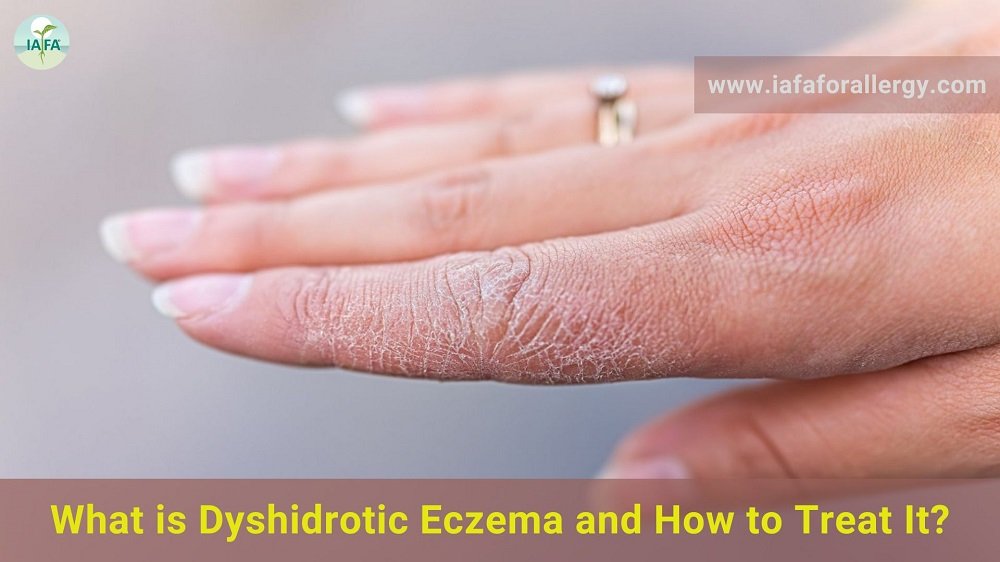The skin disorder dyshidrotic eczema, also known as dyshidrosis, is seasonal. Dyshidrotic eczema, also known as pompholyx, is characterized by extremely itchy blisters that appear on the tips of fingers, palms, toes, and soles of feet. Teenagers and adults can have dyshidrotic eczema, which can be acute, recurring, or chronic. These typically appear in groups.
The fluid-filled blisters are quite irritating. Blisters often last two to four weeks and may be brought on by stress or seasonal allergies.
Stress, exposure to metals like cobalt, nickel, or chromium salts at work, or objects like costume jewelry are just a few of the factors that can cause dyshidrotic eczema. According to Ayurveda, stomach and respiratory illnesses are intimately associated with skin conditions. Due to the tight relationship between dyshidrotic eczema and seasonal allergies, Ayurvedic pathology has a comprehensive understanding of the disease’s causes and progression.
Symptoms of Dyshidrotic Eczema
The most obvious symptom of dyshidrotic eczema is the tiny, itchy blisters. Other indications include:
- Thickening and varying in color nails.
- Blisters close to sweaty skin.
- Your fingers, toes, palms, and foot soles may all have blisters on the edges.
- Injured, red skin.
- Itching or a burning discomfort before blisters occur.
Causes of Dyshidrotic Eczema
Some of the things that can cause Dyshidrotic Eczema are:
- Anxiety
- Touch with metals like cobalt, and nickel
- Sweaty or moist hands and feet
- Warm, moist weather
- HIV disease
- Specific therapies for a vulnerable immune system (immunoglobulin)
- Seasonal allergies
Ayurvedic Treatment for Dyshidrotic Eczema
According to Ayurveda, skin diseases are caused by imbalanced pitta doshas. Since the pitta dosha is associated with heat, meals that make the body feel hotter should be avoided. The cleansing of blood and tissues is the foundation of ayurvedic treatment for skin conditions. Since herbs are the mainstay of Ayurvedic medicine (herbal remedies), the condition of dyshidrosis is treated using this system. Herbs can purify the blood and increase immunity.
 Herbs and Herbal Remedies for Dyshidrotic Eczema
Herbs and Herbal Remedies for Dyshidrotic Eczema
1. Dronapushpi (Leucas cephalotes)
When treating different skin infections, dronapushpi plays an important role. The strong herb’s rich supply of antioxidants works wonders to eliminate dangerous free radicals from the body, and its antipruritic properties help to soothe itching that is brought on by allergic disorders including patchy skin, psoriasis, eczema, acne, sunburn, scabies, etc. The effectiveness of Dronapushpi’s strong antibacterial capabilities, which are often utilized to eliminate microorganisms from the body.
2. Satyanashi (Argemone mexicana)
In Ayurveda, Satyanashi is referred to as a Rasayana that boosts stamina and strength. Almost all of the plant’s components, including the stem and blooming Ayurveda, makes use of leaves, seeds, and roots for their therapeutic benefits. Skin-related issues can be successfully treated with Satyanashi. Due to its antibacterial qualities, the powder can be used to cure a variety of skin conditions including eczema.
3. Shirisha (Albizia lebbeck)
The anti-inflammatory and analgesic qualities of Shirisha are abundant. You can apply the paste made from this herb for treating wounds and other skin conditions. It detoxifies the skin and helps to improve skin tone. The herb has qualities that are antifungal, anti-protozoal, and antimicrobial. that is used to treat eczema, urticaria, and eosinophilia, all skin conditions. The herb is also used to cure various skin conditions like boils and itching.
4. Karanja Oil
Karanja has healing and antibacterial qualities. These qualities make Karanja an effective treatment for a variety of skin conditions. With Karanja, you can treat skin conditions like eczema, abscesses, and boils. Due to its healing and antibacterial properties, Karanja oil is mostly issued to the skin to treat boils, eczema, and wounds. To aid in the healing process, its leaves’ paste can also be applied to cuts and wounds.
5. Yashtimadhu (Glycyrrhiza glabra)
This mystical herb is frequently used to heal severe skin conditions like eczema. In addition to treating numerous eczema symptoms like dry skin, skin irritations, and itching, Yashtimadhu balances the Vata and pitta doshas and prevents the formation of eczema scars.
6. Coconut Oil and Sunflower Seed Oil
Excellent moisturizers for dry, eczema-affected skin are coconut oil and sunflower seed oil. Sunflower oil helps repair the damaged epidermis layer while coconut oil has wonderful antimicrobial capabilities that prevent infection. These oils should be applied frequently to help with other eczema symptoms such as itching, irritation, and hyperpigmentation.
7. IAFA E-5 Cell Repair Oil
Eczema and other skin conditions can be effectively treated with IAFA E-5 Cell Repair Oil. Several herbs with skin-healing qualities and antibacterial substances are present in the oil. It treats eczema-related dry skin disorders and aids in repairing the skin barrier that has been compromised. Regular application of this oil has helped people with eczema on their hands, palms, and other body regions.
Conclusion
It is always recommended that before using any herbs and herbal remedies must consult with an ayurvedic expert. You can also consult Dr. Gupta at IAFA® for complete treatment of Dyshidrotic Eczema.







